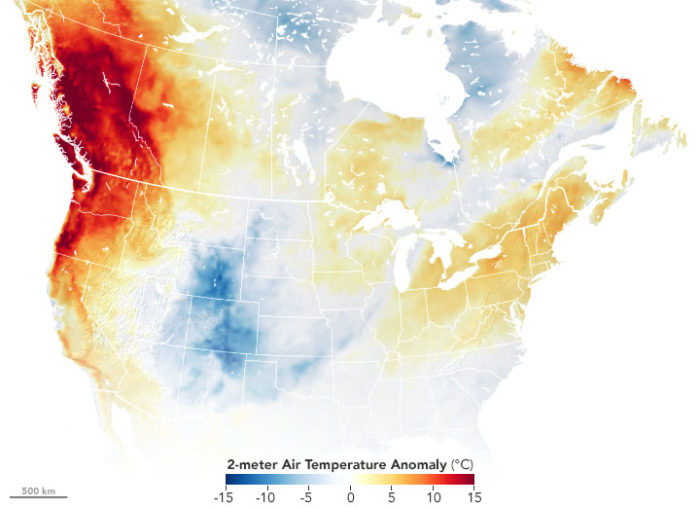Jul 09 2021
The North American Heatwave
 It has become a mantra of climate scientists that global warming is just what it says – global. It is a statistical average over time. It cannot be tied to any specific weather event, even if it predicts that statistically such events are more likely. However, the current heat wave in the North American Northwest is so statistically extreme, that climate scientists are discussing it in very different terms. For example, the BBC reports:
It has become a mantra of climate scientists that global warming is just what it says – global. It is a statistical average over time. It cannot be tied to any specific weather event, even if it predicts that statistically such events are more likely. However, the current heat wave in the North American Northwest is so statistically extreme, that climate scientists are discussing it in very different terms. For example, the BBC reports:
Its initial calculations suggest the odds of the sort of temperatures experienced in Canada occurring without climate change are very low indeed, says Professor Stott.
“It is telling us that changes in average climate are leading to rapid escalation not just of extreme temperatures, but of extraordinarily extreme temperatures,” he adds.
It’s like that UFO meme – “We’re not saying it’s global warming, but it’s global warming.” They can still only make statistical statement, but the probability of such an extreme heat wave is vanishingly small without AGW. This was the hottest June on record in North America. It was the fourth hottest June on record for the world. According to NOAA, 2020 was the second hottest year globally on record, just behind 2016.
Remember, 10-20 years ago, when the global warming deniers were saying that we haven’t had any global warming since 1998? They did a little cherry picking and chose 1998 as a baseline because it was a peak in the short term fluctuations caused by El Nino. It created the illusion that the warming trend had stopped, but it was always nonsense. But they used that to predict that global warming had stopped, that it was always just part of the natural cycle, and was regressing to the mean. Nothing to see here.
Climate scientists made very different predictions. They predicted that the 2010-2020 period would continue to warm and be the warmest decade on record. It’s always nice when two different schools of thought make very different objective predictions. In this case the climate scientists were absolutely correct, and the deniers 100% wrong. Deniers, however, are versatile. They adjust their claims based on the situation, and use what we call the motte-and-bailey fallacy. They retreat from a position when pressed, but will retake that position when they think they can get away with it. So they begrudgingly admit warming is happening, but will still take any opportunity to deny it.
In fact, they have a sliding scale of positions they can retreat to. Warming is happening, but it’s not anthropogenic. OK, it’s caused by human activity, but it won’t be harmful. Well, even if it’s harmful, there’s nothing we can do about it, or it will be more costly to try to stop it. None of these positions are valid.
The heat wave in Canada is not the evidence for AGW, but it is a stark example of it. It also shows one of the potential harms caused by AGW, increasing frequency of increasingly extreme heat waves. Keep in mind – this is happening…in Canada. The temperature reached 122 F. Many of the homes involved don’t even have air conditioning. The heat wave has been linked to hundreds of deaths.
If that number of deaths does not impress you, consider the economic damage. There is direct damage to infrastructure, lost economic activity, increased cooling bills, medical costs, and lost agriculture. The economic costs of heat waves is rising:
From 2002 through 2009, the health-related costs of heat waves was $5.3 billion. In 2019, health care costs were $3.8 trillion. That’s 18% of the U.S. economy. That’s up substantially from 1960 when costs were only $27.2 billion, or just 5% of gross domestic product.
Heat waves also lower food production. Between 1964 and 2007, drought and heat waves destroyed one-tenth of the world’s cereal production.
But won’t global warming reduce cold-related deaths? Yes it will. But the most comprehensive analysis published so far finds that most regions of the world will see a net rise in mortality – a greater increase in heat-related deaths than decrease in cold-related deaths. Further, the regions most likely to experience a net mortality increase are also highly populated yet poorer parts of the world that are least able to mitigate these effects.
Economists are also pretty united on their analysis that global warming will cost the US economy billions a year, and the world economy trillions as it progresses. The notion that it won’t be bad is just nonsense. And so is the claim that any attempt to mitigate global warming will be costly and disastrous. Of course, there are always fanatics and extremists, but it is never fair or reasonable to define one side by its most extreme proponents. There is often a perfectly reasonable position closer to the middle. In this case what we mostly need to do is accelerate the already happening transition to low carbon energy and transportation. This can be done by getting rid of fossil fuel subsidies and shifting them to green energy. We can also stop allowing companies to externalize the environmental costs of their profits. We also need to clear away unnecessary red tape slowing down new nuclear plants.
This will not crash the economy – it will make it stronger and fairer. Green energy is the energy of the future, and any economy that stays ahead of this curve will benefit.






